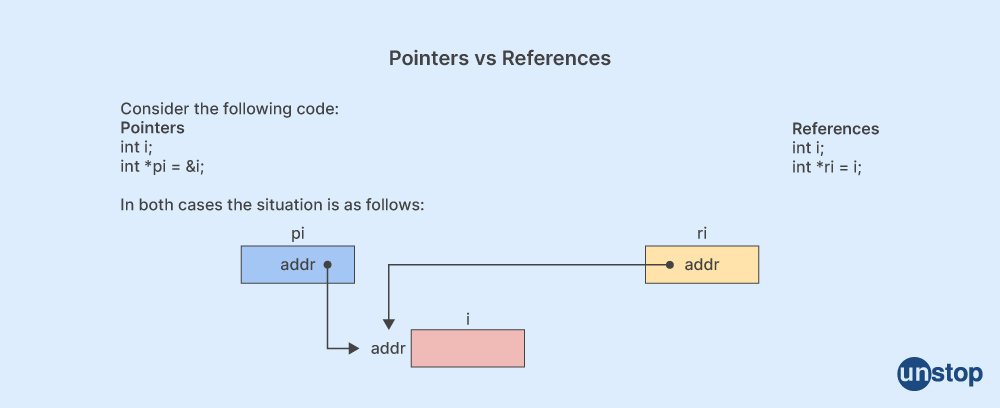You have set the flags CameraQuality and LargeStorage because you want a mobile with both features.
- Aug 2023
-
www.simplilearn.com www.simplilearn.com
-
-
unstop.com unstop.com
-
When should I use references, and when should I use pointers
Use Reference :<br /> - in function parameters and return type Use Pointer : - In the implementation of the data structure. - If pointer arithmetic or passing a NULL pointer is needed.
-
Why does C++ have both pointers and references
we introduce a new concept of reference to support function overloading
-
What is the most basic difference between a pointer and a reference?
- Declaration and intialization
- NULL
- Reassignment
-
Differences Between Reference And Pointer: A Detailed Explanation

-
Comparison Table Of C++ Pointer Vs. Reference
Reference: 1. Must Have data type 2. Cannot be Reassigned 3. automaticly deference 4. have to be initialized at the time of declaration only. 5. There cannot be multiple indirection levels in references. 6.The reference variable does not have its own address and shares the same address as the original variable, 7. Running any arithmetic operation = comiler time error 8. return address of the address it is referring to using
&9. This variable is referenced by the method pass-by-value.pointer Have same 9 but in reverse alots of them .
-
-
www.digitalocean.com www.digitalocean.com
-
srand((unsigned) time(NULL));
Providing a seed Value
-
This function requires a seed value which forms the basis of computation of random numbers
The seed value is a starting point for generating masked values
-
offset - The starting point for the range of random numbers range - The number of values between first and the last possible random number including the limits.
with this method can create a random number in range .
-
Applications of Random Number Generators (RNGs)
1.cyptography . 2.Games . 3.Randomized Algorithm .
-
The RNGs or PRNGs (Pseudo-Random Number Generators) are the building blocks of modern cyber-security and cryptography. The basic principle of these RNGs lie in some computation providing different numbers, that seem random.
-